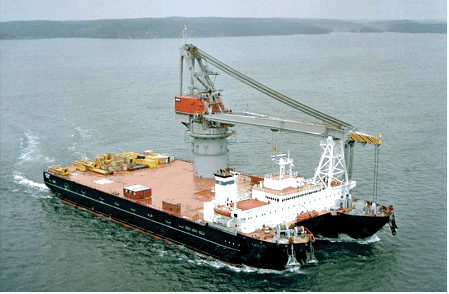Mexico Releases Crimean Vessel to Ukrainian Firm
On February 18, Ukrainian national energy company Naftogaz announced that it had secured the release and recovery of the heavy lift / offshore construction vessel Titan 2 from Mexican authorities.
The vessel had been the property of Naftogaz subsidiary Chornomornaftogaz, which was seized by the Russian-allied breakaway state of Crimea in 2014.
“This is the first time that an authorized agency of another country has officially recognised [Ukraine's] Chornomornaftogaz – which was re-registered in Kiev after Russia’s occupation of the Crimea – as the owner of property that belonged to [Crimean] Chornomornaftogaz,” Naftogaz said.
The catamaran-hull Titan 2 had been under bareboat charter to Mexican firm Oceanografia SA de CV, which has since gone bankrupt. Mexican authorities seized the vessel in the bankruptcy proceeding, and Ukraine's embassy, Naftogaz and local vessel arrest experts worked to win her release.

Naftogaz said that the ship had been damaged in a grounding during heavy weather. She is presently at anchor near the Mexican port of Ciudad del Carmen, on the Gulf of Mexico, and the Government of Ukraine will decide on plans for her redeployment, the firm said.

that matters most
Get the latest maritime news delivered to your inbox daily.
Separately, on Thursday, Naftogaz said that it had served notice to Russian Federation officials that it intended to either negotiate an arrangement with them about assets seized during the Crimean annexation, or to seek arbitration if a negotiated solution could not be found.
Ukrainian officials and Russian-affiliated entities have been engaged in standoffs over Black Sea assets before, notably in a confrontation in December over the towing of state-owned drilling platforms worth hundreds of millions into Russian territorial waters. Ukrainian officials have also worked to restrict shipping to Crimean ports, issuing technically legal port closures – Crimea is still part of Ukraine under international law – and promising vessel arrests and crew bans for ships calling at the Russian-backed region.
